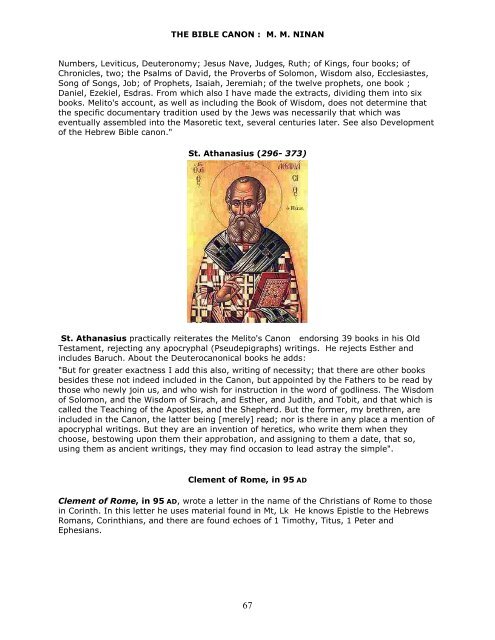You also want an ePaper? Increase the reach of your titles
YUMPU automatically turns print PDFs into web optimized ePapers that Google loves.
THE BIBLE CANON : M. M. NINAN<br />
Numbers, Leviticus, Deuteronomy; Jesus Nave, Judges, Ruth; of Kings, four books; of<br />
Chronicles, two; the Psalms of David, the Proverbs of Solomon, Wisdom also, Ecclesiastes,<br />
Song of Songs, Job; of Prophets, Isaiah, Jeremiah; of the twelve prophets, one book ;<br />
Daniel, Ezekiel, Esdras. From which also I have made the extracts, dividing them into six<br />
books. Melito's account, as well as including the Book of Wisdom, does not determine that<br />
the specific documentary tradition used by the Jews was necessarily that which was<br />
eventually assembled into the Masoretic text, several centuries later. See also Development<br />
of the Hebrew <strong>Bible</strong> canon."<br />
St. Athanasius (296- 373)<br />
St. Athanasius practically reiterates the Melito's <strong>Canon</strong> endorsing 39 books in his Old<br />
Testament, rejecting any apocryphal (Pseudepigraphs) writings. He rejects Esther and<br />
includes Baruch. About the Deuterocanonical books he adds:<br />
"But for greater exactness I add this also, writing of necessity; that there are other books<br />
besides these not indeed included in the <strong>Canon</strong>, but appointed by the Fathers to be read by<br />
those who newly join us, and who wish for instruction in the word of godliness. The Wisdom<br />
of Solomon, and the Wisdom of Sirach, and Esther, and Judith, and Tobit, and that which is<br />
called the Teaching of the Apostles, and the Shepherd. But the former, my brethren, are<br />
included in the <strong>Canon</strong>, the latter being [merely] read; nor is there in any place a mention of<br />
apocryphal writings. But they are an invention of heretics, who write them when they<br />
choose, bestowing upon them their approbation, and assigning to them a date, that so,<br />
using them as ancient writings, they may find occasion to lead astray the simple".<br />
Clement of Rome, in 95 AD<br />
Clement of Rome, in 95 AD, wrote a letter in the name of the Christians of Rome to those<br />
in Corinth. In this letter he uses material found in Mt, Lk He knows Epistle to the Hebrews<br />
Romans, Corinthians, and there are found echoes of 1 Timothy, Titus, 1 Peter and<br />
Ephesians.<br />
67


















